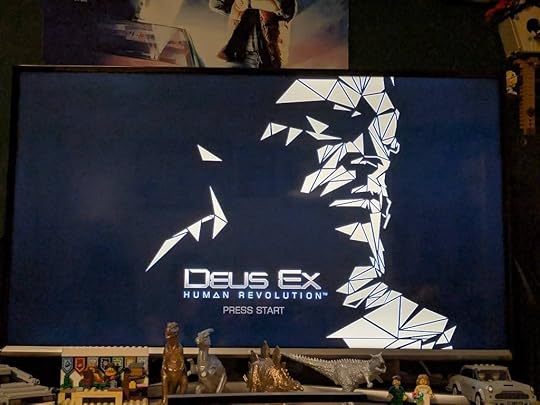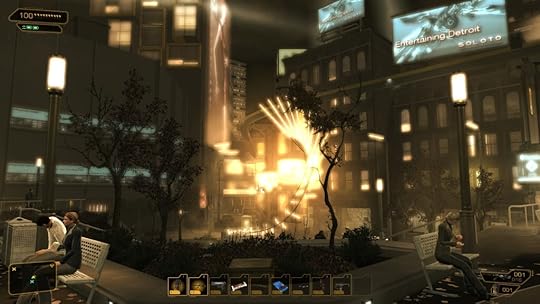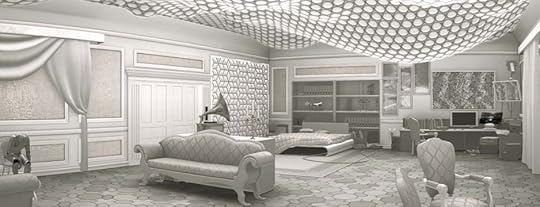Aesthetic Storytelling: Deus Ex
Every so often, I find my brain tinted gold. I find myself thinking of grimy streets and shining metal, of neon signs and towering buildings. The internal soundtrack of my brain is replaced by atmospheric synth. I catch myself searching for ‘gold sunglasses’ online. I wish I could pull off a frock coat.
And eventually I give in to the inevitable, and sit down to play Deus Ex again.

I have talked about these games before, at some length, but I will never not be willing to do so again. Human Revolution and its sequel Mankind Divided – and, incidentally, the handful of interquel novels and comics floating around, most notably Black Light – are some of my absolute favourite stories ever committed to disc or page. I love cyberpunk in all its forms – love me my Gibson and my Blade Runner and all things besides – but I might just love Deus Ex most. I will not wax lyrical about the story today – I’ve done that before, and while it’s a very well-written spiral into conspiracy, revenge and revelation that’s not quite why I picked up a controller again this time. This time, I just wanted to immerse myself in the vibe.
This is Human Revolution we’re talking about, the first of the modern Deus Ex games, which, distressingly, was released 14 years ago. And is set in 2027. It’s about to actually happen and we still haven’t got our cool robot arms; corporate overlords, you have let us down as a species. I do own this game in its Director’s Cut form on PC – but this time, I dusted off my Dualshock and turned on my good old reliable PS3 copy. Partly, I wanted the bigger screen; partly, my hard drive is too full of Baldur’s Gate 3 to download it again. But mostly, it was this:
 Image credit (and gold filter mod credit) goes to Silent.
Image credit (and gold filter mod credit) goes to Silent.This is how Human Revolution is supposed to look. Everything, and I mean everything, has this gorgeous golden tint: the UI is golden, the object highlights are golden, most of the game takes place at night or in the evening so it’s all sunset and streetlights. Not everyone, however, thought that this was a nice effect, and so when the PC version came out, the ‘piss filter’ was removed. And the game looks terrible. Because it’s not just a cosmetic change: the gold is there for a reason. This is the Second Renaissance, or so the supporters of human augmentation consider it: this is the dawn of a new age of humanity, with riches and splendour just around the corner. The golden light plays beautifully with the classical wardrobes and elaborate patterns that pro-aug characters sport, with their old-fashioned architecture, with their conscious echoing of that first Renaissance in their every aesthetic choice. The golden light is the light of that new dawn.
Or, if you’re a critic, then perhaps it’s the sunset; perhaps it’s the end of humanity as we know it, perhaps it’s the exact opposite. Perhaps this is our last glimpse of what it means to be a normal ‘human’. The constant evening setting of the game helps keep this theme in mind: it is very much not all sunshine and roses in the world of Deus Ex. Your first proper mission is against anti-aug terrorists, you spend much of the game debating those against augmentation, and given the circumstances in which Adam Jensen was altered, it’s hard not to think that they have a point.
And even without all that context weighing it down, the colour palette of the game serves a vital story purpose towards the end. Jensen spends the whole game in this golden twilight, sinking deeper into the dark as he unravels the conspiracies around him. The player’s eyes get used to it, to this sunrise/sunset world.
And then, without warning, when the revelations are building to a head, you are dumped into a pure white room.

Not a scrap of gold to be seen, on any surface; pure, cold white lighting, no sun, no streetlights; still opulent but without a speck of that colour your eyes have been taking for granted for hours of gameplay now. Even the always-golden computer screens are greyscale. It’s visually jarring, genuinely shocking every time no matter how many times I play this game – and it is, of course, accompanied by one of the biggest revelations of the whole plot. Jensen’s world is shattered in that white room. Using the colours of the environment itself to unsettle the player at the same time is a stroke of genius. It’s storytelling through pure aesthetic. I love it.
Also, black and yellow is just a very good colour scheme.
Removing that filter just… didn’t work for me. To the point that when I got the PC version I played about 5 minutes before I sought out a mod to put the gold back in, and was far happier with it. There is no Deus Ex for me without that twilight feeling, that evening ambience of potential and decline, all at once. It’s a masterclass of storytelling without having to use a single word, without even having to use an object, though they help.
Hard to do in prose, I’ll admit. But I hope that I can come close, even if I am limited by clumsy language.
To quote the game: “It’s not the end of the world, but you can see it from here.”



